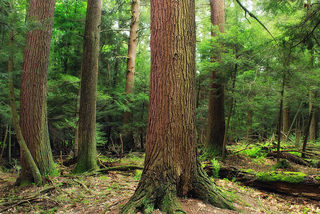| People tend to feel uneasy about things over which they have no control. It can be difficult, therefore, to read the tragic story out of Provo on Monday concerning two young boys who were seriously injured when a tree fell on the tent they shared with the rest of their family. We naturally feel unease. Perhaps “fear” is a better word. |
| | How many trees do you walk under each day? How many heavy limbs are ready to break with you or your children passing beneath? Much of the West has been in a prolonged drought, and drought can weaken a tree’s roots, making it susceptible to winds even though it looks healthy. It doesn’t help when you Google the subject and read similar stories from around the country. --On Father’s Day, Craig Walz, the 43-year-old brother of Rep. Tim Walz, D-Min., was killed when a storm toppled a tree onto his tent. His son was critically injured. --On June 21, lightning caused a tree to fall into a cabin at a camp in southeastern Indiana, killing an 11-year-old girl asleep inside. --Also in June, a thunderstorm caused a tree to fall on a house in West Point, Ga., killing a baby. It’s enough to make you put your phone in your pocket and look up at all times. In Utah, some firefighters call the type of Willow that struck the family in Provo a “widowmaker.” Well, calm down. Yes, trees and tree limbs can crash down without a moment’s notice. They stand a better chance of doing so during severe weather. But you should be more afraid of the flu, or of driving in a car — much more. Statistics are hard to come by. I’ve found claims that anywhere between 78 and 100 people are killed by trees each year in this country. In a Philadelphia Enquirer news story published seven years ago, the best the Centers for Disease Control and Prevention could do was refer to statistics showing 700 people die from falling or thrown objects of all kinds. Falling trees would be a small subset of this. That is of no comfort to the 9- and 7-year-old boys who were hurt in Provo early Monday, but it provides some important perspective. That Enquirer story seven years ago quoted risk consultant David Ropeik as saying people tend to overestimate small risks, just as they worry about things over which they have no control. In truth, you don’t need to worry about going camping this summer. Sure, something horrible might happen, but it probably won’t. And, really, something horrible could happen just about anywhere, but it probably won’t. |


 RSS Feed
RSS Feed

